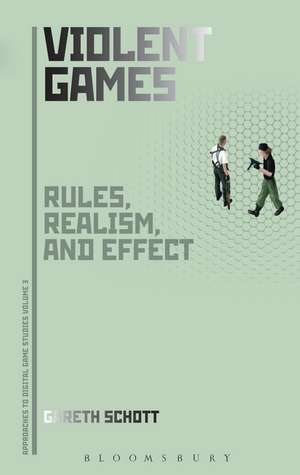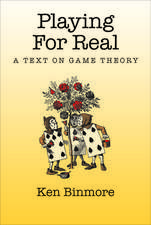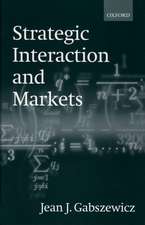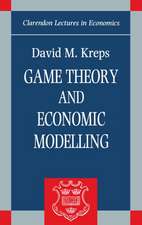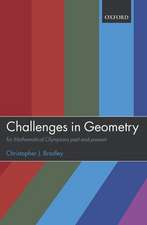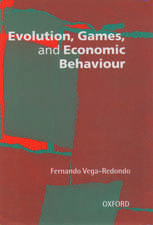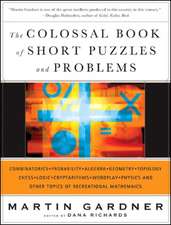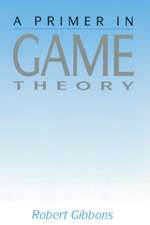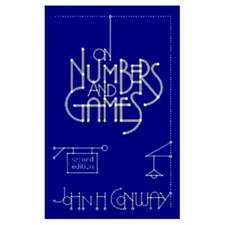Violent Games: Rules, Realism and Effect: Approaches to Digital Game Studies
Autor Gareth Schotten Limba Engleză Hardback – 27 iul 2016
| Toate formatele și edițiile | Preț | Express |
|---|---|---|
| Paperback (1) | 238.22 lei 6-8 săpt. | |
| Bloomsbury Publishing – 27 iul 2016 | 238.22 lei 6-8 săpt. | |
| Hardback (1) | 831.52 lei 6-8 săpt. | |
| Bloomsbury Publishing – 27 iul 2016 | 831.52 lei 6-8 săpt. |
Preț: 831.52 lei
Preț vechi: 1066.13 lei
-22% Nou
Puncte Express: 1247
Preț estimativ în valută:
159.13€ • 172.79$ • 133.67£
159.13€ • 172.79$ • 133.67£
Carte tipărită la comandă
Livrare economică 23 aprilie-07 mai
Preluare comenzi: 021 569.72.76
Specificații
ISBN-13: 9781628925623
ISBN-10: 1628925620
Pagini: 288
Ilustrații: 25 bw illus
Dimensiuni: 140 x 216 x 18 mm
Greutate: 0.48 kg
Editura: Bloomsbury Publishing
Colecția Bloomsbury Academic
Seria Approaches to Digital Game Studies
Locul publicării:New York, United States
ISBN-10: 1628925620
Pagini: 288
Ilustrații: 25 bw illus
Dimensiuni: 140 x 216 x 18 mm
Greutate: 0.48 kg
Editura: Bloomsbury Publishing
Colecția Bloomsbury Academic
Seria Approaches to Digital Game Studies
Locul publicării:New York, United States
Caracteristici
Demonstrates how game studies approaches possess the necessary conceptual and analytic tools to have an impact on the societal misconstruction of games and the practice of game playing
Notă biografică
Gareth Schott is Senior Lecturer in Screen and Media Studies at the University of Waikato, New Zealand. He has been an active writer and researcher in the field of game studies since its inception in 2001. Schott is the co-author of Computer Games: Text, Narrative and Play (2006), a major output from the Arts and Humanities Research Board (UK) funded study conducted at the Institute of Education, University of London with colleagues David Buckingham, Andrew Burn and Diane Carr.
Cuprins
PrefaceChapter 1 - Violent Games / Game ViolenceChapter 2 - Violent Media as a Political ConceptionChapter 3 - Games as ArtificeChapter 4 - Subjective RealismChapter 5 - Performative Inquiry,Intent and AwarenessChapter 6 - The Activation of ViolenceChapter 7 - The Aestheticisation of ViolenceChapter 8 - Undeniable Content and Serious IntentChapter 9 - Adopting a Configurative SensibilityBibliographyIndex
Recenzii
Gareth Schott's examination of the debates surrounding violent video games presents an important and fresh perspective on this contentious issue. Given the moral panic surrounding games, scholars have increasingly been calling for more sociological examinations of the phenomenology of media panics and media research itself. Schott's work represents a cogent effort in this regard that should be required reading of all students and scholars of media effects.
The interrelationships between video games, virtual or simulated aggression, violence and ludic fictionality are among the most complex and controversial in the fields of studies and culture of video games. Based on a thorough examination of existing game research and new evidence, Gareth Schott's book is the most comprehensive and thoughtful reflection yet written on game violence. The reader will not only learn about how violent elements become experienced in the context of video game play, but also to reappraise what we mean by 'violence', to start with. Learned and articulate, Violent Games will open new avenues for thought for both students and scholars, and also provide a solid foundation for the decision making by parents, educators and policy creators alike.
Wonderful read. Schott takes a thoughtful and balanced approach at explaining the complexity around media effects broadly and video game violence specifically, and does a superb job of weaving together scholarship from a variety of expected (communication, game studies/game theory, media psychology, rhetoric) and unexpected (criminology, dramaturgy, film studies, sociology, just to name a few) areas. The result is a volume easily accessible to a variety of different audiences - a touchstone for designers and scholars, a comprehensive reader for a graduate-level seminar on video games, and chapters of the book would be accessible to younger audiences, such as undergraduates. The book blends familiar and unfamiliar scholarship to help better address the "real issues" around the video game violence debate, as the volume puts those issues into focus. The result is a book that marks the past and present of game studies, and offers myriad suggestions for the future of the same.
The interrelationships between video games, virtual or simulated aggression, violence and ludic fictionality are among the most complex and controversial in the fields of studies and culture of video games. Based on a thorough examination of existing game research and new evidence, Gareth Schott's book is the most comprehensive and thoughtful reflection yet written on game violence. The reader will not only learn about how violent elements become experienced in the context of video game play, but also to reappraise what we mean by 'violence', to start with. Learned and articulate, Violent Games will open new avenues for thought for both students and scholars, and also provide a solid foundation for the decision making by parents, educators and policy creators alike.
Wonderful read. Schott takes a thoughtful and balanced approach at explaining the complexity around media effects broadly and video game violence specifically, and does a superb job of weaving together scholarship from a variety of expected (communication, game studies/game theory, media psychology, rhetoric) and unexpected (criminology, dramaturgy, film studies, sociology, just to name a few) areas. The result is a volume easily accessible to a variety of different audiences - a touchstone for designers and scholars, a comprehensive reader for a graduate-level seminar on video games, and chapters of the book would be accessible to younger audiences, such as undergraduates. The book blends familiar and unfamiliar scholarship to help better address the "real issues" around the video game violence debate, as the volume puts those issues into focus. The result is a book that marks the past and present of game studies, and offers myriad suggestions for the future of the same.
